|
Hunger attraction “Stay! Keep a distance_” A talk to set people free For a slave master arrived_ Descended and made self at home In the East_ thus had to spread To the West, North and South Like the wings of a bird Ready to migrate... “Isolate! Keep in quarantine_” An innocent directive lifting guilty Repercussions to! summon the less And even the used-to-be privileged_ Into the shelter of insufficiency. “Listen to live_ to die!” The best option there is_ there was And there will be...because it feels better To live and die_ than to die at first glance Without a face mask and clean gloves. The world wrestles dirt and entirely Becomes cleaner than a whistle_ But when the referee blows the whistle The bellies carry cleanliness more than the food, It was just but supposed to carry in the, Pre-virus period -- hence godliness becomes Easier as the wholeness died of Hunger and thirst. No more brother’s keepers as the brother Lies on a deathbed coughing, sneezing, So feverous and in dire need to provide Food for his other brother but... The virus took the muscle back to the gym And watched weakness, panic and fear Awash the land with destruction. Where did the virus come from? Why did the virus come at a time of this? The aftermath and the present-math Is a world full of hunger and what’s_ there for us When the end just comes to an end? 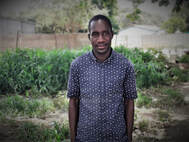 Martin Chivaku is a poet from Zimbabwe. You can find Martin on Twitter here: Chivaku Martin
0 Comments
My Pantry Big jars full of quinoa, brown rice, millet, even teff and couscous. A poor flat world—Bolivia, Bengal, Zambia, Ethiopia, Morocco-- has given me here in the Shenandoah Valley these exotic food gifts. Countries trade staple foods for milk condensed and gushed into cans from the teats of cows overgrazing our western prairies. The rich flat world desires ever more, whatever grows over the horizon. But we need some hills to see over. So, tariffs and custom controls. Now the voracious virus has jumped the man-made walls. The entire flat world flips over like an omelette missing the pan. Village farmers in Bolivia, Bengal, Zambia, Ethiopia, Morocco, can no longer tread the feeder roads to haul their crops to market. Families in war zones—Yemen, Sudan, Ecuador—have no safe moist soil for food. Humans there waste with hunger. Starvation soon. I watch the news and close my eyes at swollen bellies, infant eyes enormous, arms and legs like the shift sticks on our farm trucks. Not in my back yard, though. I have learned what inanition does to school-age children with supurating sores, mothers with breasts like emptied sandwich bags and black eyes when frustrated fathers rage with their hands. And now the food banks in my home town are short of basics for the long lines of hungry here in this rich agricultural valley. And this season, I plan to grow in my own back yard potatoes, cabbage, onions, beets and maybe sunflowers as a luxury. 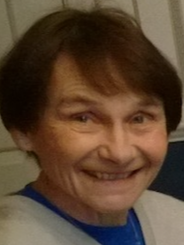 Linda Ankrah-Dove has done aid work in many food-insecure countries. She now trusts poetry to touch hearts and motivate us to change the world into a healthy paradise for all. This Virus Knows No Boundaries Farmers turn the dirt My uncles in rural Michigan sure did My birth certificate says occupation father: farmer With borrowed tractor and harrows strong Corn, vegetables, dairy, and beef My big sisters helped, could name all the tools We put up vegetables to eat all winter Farmers turn the dirt In rural Senegal my uncles farmed too My host tribe so gentle and generous, and poor With hand tools from branches and backs bent strong Millet and sorghum in the rainy season My little sisters hauled water, prepared our food Fight the birds and rats, make it last all year To see the video of Paul reading his poem, click on the button below - it will open and start playing in a new window:
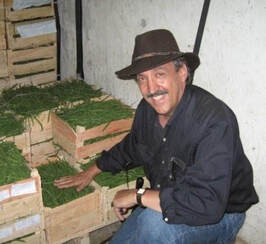 Paul Guenette is a recently retired economic development manager with expertise in international agribusiness. Mr. Guenette designed and managed development programs in a career spanning 45 years and 90 countries. Inspired by a Cheyenne story W/editing assistance by Wayne Leman TSESSOHPETANENĖSTOVE TSEXHOTOVANATO: hetsėtseahe LIVING THROUGH DIFFICULT TIMES: an analogy of today. Mo’aenevėhanehe. Mo’ȯseetonetȯhanehe. It was winter time. It was very cold. Hesta’se mohma’xėhovėsetsevanȯhehe. Snow was piled everywhere. Kȧhamaxėstse tseohkėho’ėšeme moma’seohtsehanehe. Camp firewood was being used up. He’nostonėšemȧhanevȯse moxheomėsėhaahpe’eenoo'ehanehe. No one could go after firewood because the snow was too deep. He’nostonėšenȧho’ȯhtsevȧhtsevȯhtse. They could not even visit each other. Hestamevo mohno’easema’seohtsehanetsehe Their food was dwindling. Menȯhtse naa honovohko mo’asemȧheestȧhenovohe. Berries and dried meat were being depleted. He’nostonėšeeve’tomo’evȯhtse. It was difficult to go to another teepee to get some food. Heseeotȯtse, hetanevano’ėstse, šeštoto’e mo’asema’seohtsehanevotse. Medicinal herbs, man sage, cedar and other healing plants were vanishing also. He’nostonėševestȧhemovȯse tsehaomohtȧhetsese. It was difficult to heal those who were sick. Otaxa mohxaehe’kėto’omoehevohe heveenotsevotse The only thing people could do was to stay in their teepees. Kȧsovaaheho naa hetaneo’o tseešėhaa’ehahese mohtaohkėheemȯhenėhevohe, hovahno he’nohkeme’ovovȯse; otaxa mo’ȯhkeevȧho’ėho’ȯhtsevo. Young boys and older men went hunting, they could not find any animals; they came back empty-handed. “Nahko’e, neseemȧhehaeanama, natao'sėhenȯhtsevoomoo’e hotovao’o naa heva vaotsevahno,” heške moxhetȯhevohe. “Mother, we are all so hungry. I’m going to look for buffalo or deer,” he told his mother. Mo’exovee’ėsanėhehe. “O’haetanoo’e” heške moxhetaehevohe. Mȧhtohto hohtȧhnaesohto aenamėhehe mohnėhestȯheaenamȧhehe. He dressed warmly. “Be very careful,” his mother said. He was only 16 years old. Nešee'ėše mo’eohtsėhehe. Moxho’oxeohtaanėhehe tohtoo’e. Naohkeva’neaestomenestovoo’e Esevone moxhešėtanȯhehe. He wandered for two days. He decided to stay out one more night. He thought he could hear the rumbling of buffalo somewhere. Tsehtšėšeepėhevevoo’ȯhtse na’ėstse hotova’e moso’hovenehoveoeotsėhehe. Mohma’xeoeveohtsėhehe. Nėseehaesto esevone moso’hovenehoveoehevohe. Once he was settled and warm, he prayed to Ma’heo’o, asking for guidance for himself and food for his people. Then, finished, he looked around. There a distance from him, a buffalo suddenly stood up and shook the snow off. Soon, there were many buffalo standing up, shaking off the snow, and beginning to graze as only buffalo knew how. Mohva’neahto’heenȧhevohe. They had just been buried in the deep snow. Nehe hetaneka’ėškone mostaevėhenėhetȯhevohe hevo’ėstanemo. That young boy went to tell his people what he had seen and where. Tse’ešeevama’seanehnevȯse naa tse’ešeevamȧhena’so’enȯhevȯhtse mo’oesevehohevohe nehe hetaneka’ėškone. Hotovao’ȯhme’ovȯhtse. When the meat was butchered and all were fed, a name was ceremoniously given to the young boy: The one who finds the buffalo. 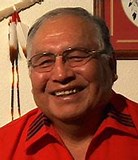 Dr. Richard E. Littlebear is President and Interim Dean of Cultural Affairs at Chief Dull Knife College located on the Northern Cheyenne Reservation in Montana. He actively promotes bilingualism, advocating for bilingual education on a local, state, national and international level. He encourages the continued oral, written and reading usage of the Cheyenne language specifically, and of all indigenous languages generally. He considers learning to read and write the Cheyenne language -- his first language -- as his greatest academic achievement. Questions What do I know of hunger? They say the starving dream of food. I heard Depression era stories My mother’s painful account: days with nothing to eat. I confused her with Cinderella. What do I know of hunger? They say the starving dream of food. There were childhood commandments My father’s admonition: please finish everything on the plate. There were children in Europe with nothing. What do I know of hunger? In dreams I see old lovers, old cities, I fall from trees and mountains, Forget exams, speeches, names of others. They say the starving dream of food. What is the difference between hunger And starvation? A few days, a week or so? A difference in dreams, perhaps? Here is a video of Judith reading her poem.  Judith R. Robinson is a poet and visual artist from Pittsburgh, Pa. WHERE DOES THE CHILD SLEEP TONIGHT? Where does the old man sleep tonight? In his stately home on a quiet street, away from the city’s noise, and the stress of governing, of calculating returns on investments, profit margins, and collateral damage. Where does the young girl sleep tonight? In her mother’s arms in the desert night. In the squalor of a camp or a fetid slum. On the side of a Mexican road, fleeing the violence that grows from corporate greed and trickle-down fantasies-- surplus for Empire to count and cast aside.  Michael Ratcliffe is a geographer and poet who lives and writes between Baltimore and Washington. When he is not writing poetry, he manages geographic programs and teaches population geography. More Than Just Food For Thought Hunger has no borders, it impacts all ages in many places. Besides many living from paycheck to paycheck or who may have not yet to received unemployment, whatever the reason, hunger is a reality for many. Let’s stop dividing each other into categories. This is not the time to argue over basic human needs. Humanity doesn’t ask why, rather it asks us to share and provide food without questions. Here is the link to Nina reading her poem on Youtube: https://www.youtube.com/watch?v=KcmgUT2m-Kc&feature=youtu.be  Nina Padolf, EdD. co-edited: Nasty Women and Bad Hombres Poetry Anthology, (Lascaux Editions, 2017);Is It Hot In Here Or Is it Just Me?: Women Over Forty Write on Aging, (Social Justice Anthologies, Amazon, 2019) and poetry has appeared in various journals such as Chiron’s Review and Ekphrastic Review. She is currently working on a memoir which explores growing up adopted, overcoming difficulty in school, and the unfortunate murder of her sister. Rescuers Rescuers on fork-lifts bring us boxes Filled with peanut butter, tuna, rice. Rescuers answer phones, say thank you to those who bring bags To the warehouse door. Rescuers drive trucks to churches, Safe houses, community centers, Places where the poor are given Food, a smile, and a promise of more. Rescuers stand on cold December days Outside of grocery stores, Asking for donations—a can Or a dollar, while music from a local station Warms them with golden oldies. Rescuers bring healthy snacks to children In summer where after basketball or Puppet-making, their sweet bellies growl. We are all rescuers and rescued. Kindness is an antidote to fear. Hot soup, a sandwich fills us, Both the giver and the given With gratitude. 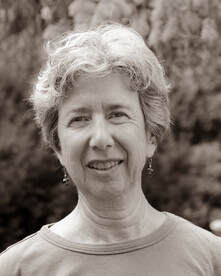 Sue Budin is a retired librarian who volunteers with Food Gatherers, a food rescue program in Ann Arbor, Michigan. She also works with English as a Second Language students, and is a docent for children at the University of Michigan Art Museum. FOUR WALLS CAN'T HOLD ME TONIGHT Four Walls can’t hold me tonight Of course, they never have: A slab of stone hardly a salve For lone hands reaching into trash For a pitiable stash of food Enough to make it through Unfettered and unchained Called out of name for just wanting A drink, a touch, and not much else prerequisite. Four walls can’t hold me tonight My flight in air A safer fare for folk Anxious for a place to just lay down And not found sullied by morning. And Not found blighted by morning By man-contrived live viruses Eschewing the virtue of open space Lacing homeless man With menace-mangled death. It is because I’m homeless It is because I hunger It is because my clothes hang about me In shreds. And the dread you’d feel Stepping into my shoes Crying my blues And losing a piece of yourself To call me friend. Four walls can’t hold me tonight And won’t As the earth decries the sight Of me, loosely sheltered under K-Street Bridge And you safely snuggled under coverlet Of your feather bed. 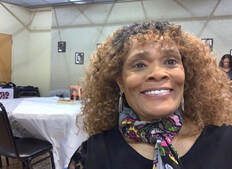 Billye Okera has been writing poetry since the age of seventeen. Considering herself a Folk-Performance Poets, she is the author of two books The Mourners’ Bench, and The Days of Me and God. At seventy, she has several other projects for publication within the next year. She is the mother of three, and grandmother of eight. She resides in Ft. Washington, MD. To aid or not to aid: that is the question: Whether ‘tis better for others to suffer The baskets of maize from lands of foreign, Or to take arms against a sea of troubles, And by giving end them. To listen: to dictate; No more; and by dead aid to say we end The malnutrition, and the thousand natural shocks That the lands are bound to, ‘tis a consummation Devoutly to be evaded. To listen, to dictate; To listen: perchance to care: ay there's the rub; For in that aid, corruption arises, When we’ve extracted all resources, Must give us pause; there’s the alliance That grants access to exploitation; For who would bear the prosperity and not the graves. The poem is modelled on Mr. Shakespeare's famous lines form Hamlet. 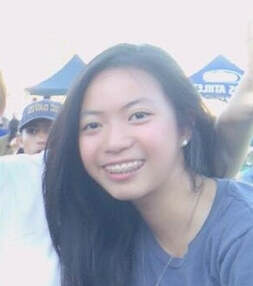 Chantal Do is a second-year student at UC Davis majoring in International Agricultural Development (with an emphasis on Economics & Trade). Chantal hopes to make a change in the world so that less people have to suffer. |
Now more than everThese poems have been submitted to the call for poetry "Now more than ever" Archives
October 2021
Poets
All
|
||||||
 RSS Feed
RSS Feed